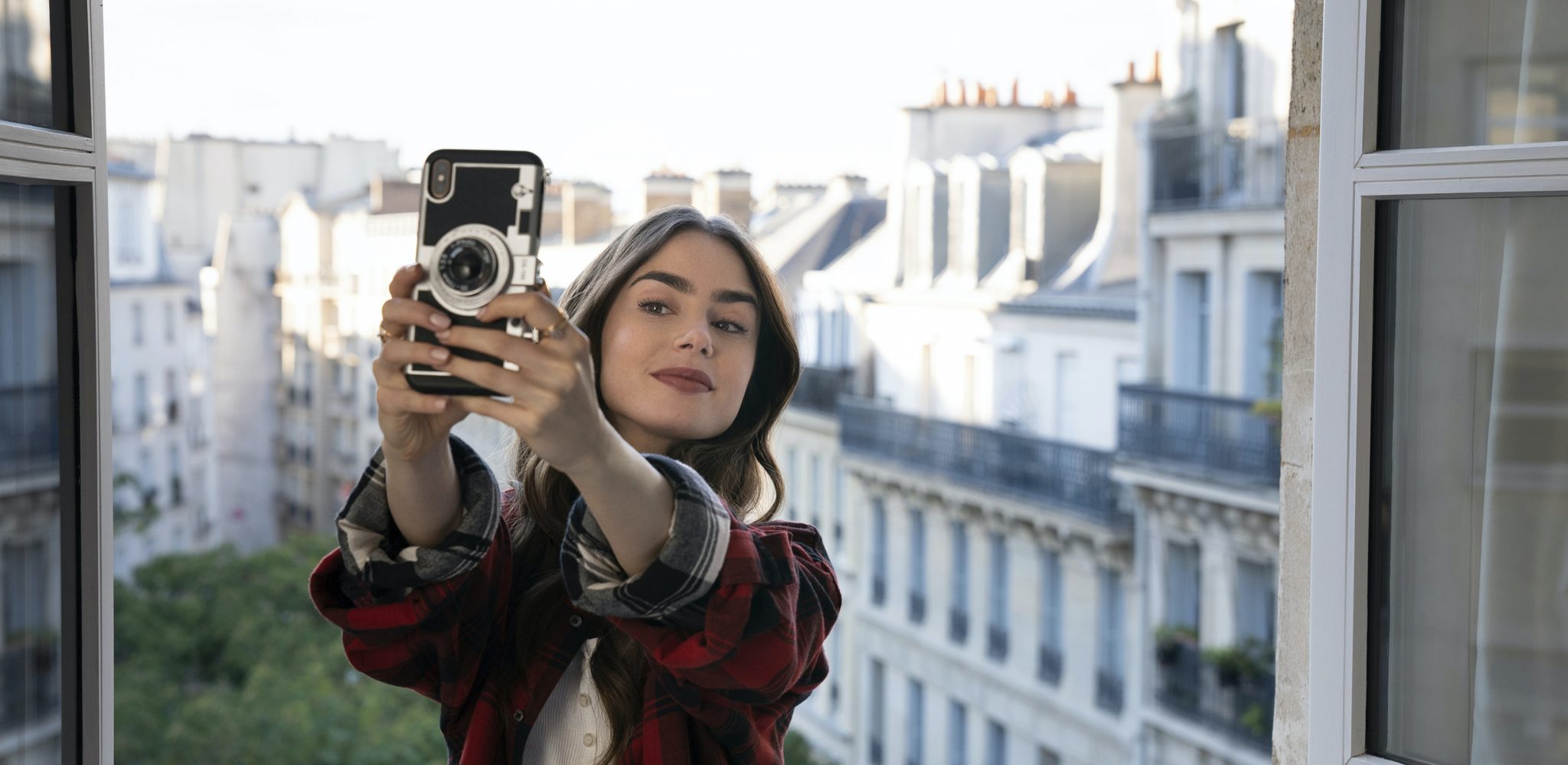The Netflix show tells us exactly what TV producers think of young women: all mermaid curls, no brains
For what felt like ages I held out against watching Emily in Paris (2020). As an American in Paris I loathe the stereotype of the American in Paris, and only relented when BBC Scotland asked me to come on air and talk about the show. Ah, I thought. A chance to tell the world – or, well, Scotland – how much I loathe this stereotype.
I’m only mildly embarrassed to admit I watched the whole show in two nights. I may even have giggled at a few of the jokes, and sighed at some views of Paris, even though Paris is right outside my door. ‘Paris of the mind is preferable to the real thing,’ as Moyra Davey once wrote. But once I’d left the bubble of pleasure the show created, I was left with a hangover of ambivalence.
The writing is objectively terrible; it feels like it was written by a scattershot team consisting of The One With the Jokes, The Hack, and The One Who Went to Paris Once. The Hack is responsible for all the flat-footed dialogue (“you’re not stepping on my toes, you’re stepping into my shoes!”), coming up with lines like Carrie Bradshaw at her punniest (“I’m petit mort-ified!”). The Funny One is, occasionally, very funny (see the vagin jeune storyline). And The One Who Went to Paris Once must be responsible for the white-washing of the city, the xenophobia towards the French, the unflinching commitment to being as ringarde as possible, and no that does not mean basic.
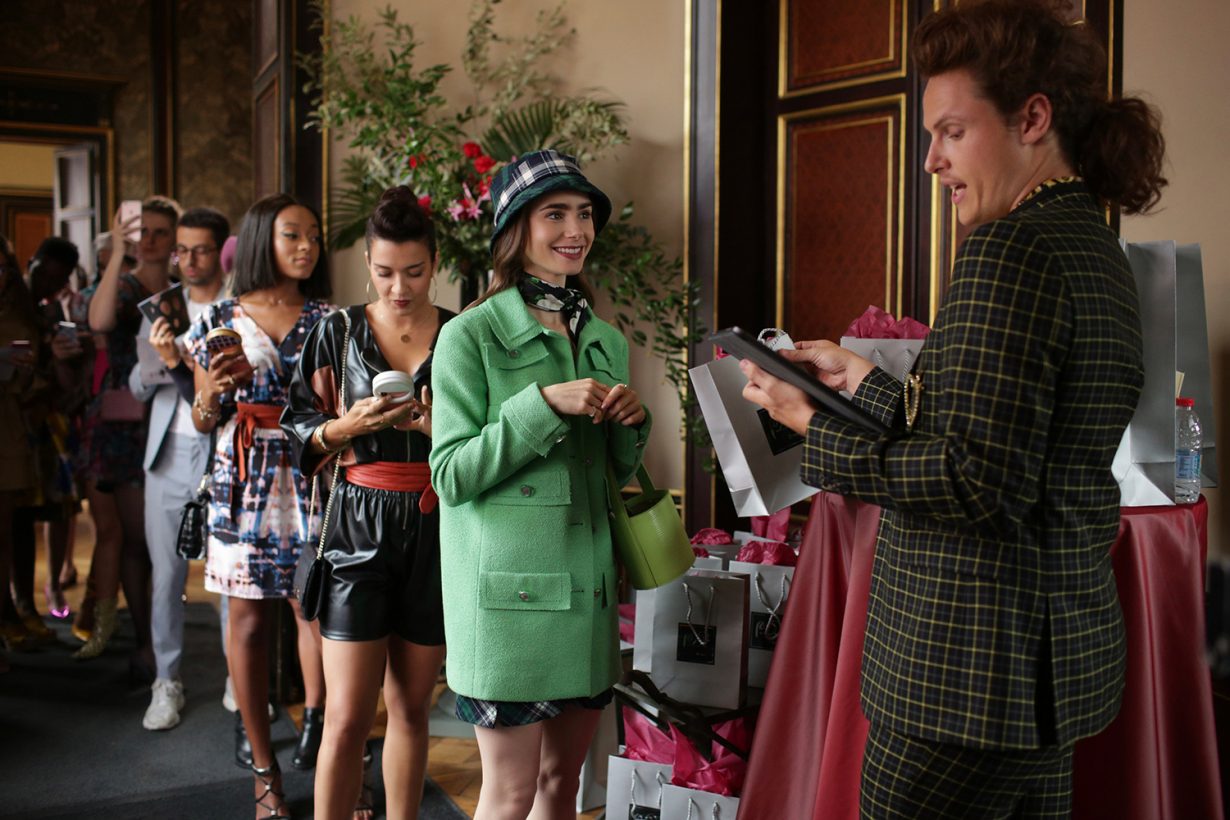
But what rankled about the show, I realized, isn’t all it gets wrong about France and the French – this is fantasy, not Italian neorealismo. It’s the show’s limited and, yes, misogynist conception of who Emily is, and who it allows her to be.
There is an element of Everywomanness to her. She is hard-working, plucky, and resourceful when faced with challenges and trials, and doesn’t have any inconvenient special talents like, I don’t know, speaking French to get in the way of the target audience identifying with her. Like Christian in The Pilgrim’s Progress, she’s your average questing hero(ine). But where John Bunyan’s seventeenth-century religious allegory wonders if salvation exists, and if so, how can we attain it, in the world of Emily in Paris, redemption comes in the form of Instagram followers and bank. “Beyoncé’s worth far more than the Mona Lisa,” quips her best friend, approvingly. Paris is the City of Destruction and the Celestial City all at once.
The degree to which Emily is ‘relatable’ constructs the audience as similarly young, white, and sheltered; if this ‘average’ viewer were suddenly moved by their employer to Paris, they might fare much like her – providing they were gorgeous and impossibly thin, with enough money to buy a closetful of Louboutins. This is the same problem that feminists have had with media and advertising as long as these things have existed: we’re being asked to consider that the skinny pretty girl is just like us, when she so blatantly isn’t; and then, in measuring the distance that divides us, we are left to measure our shortcomings, and to contemplate how we can make ourselves more like her. Cue the beauty industry, the diet industry, fast fashion.
Yet like a good comic hero, Emily is also somehow worse than us: witness the many people online complaining that she is, in fact, not relatable; she is ‘arrogant,’ ‘annoying,’ ‘entitled.’ She is these things, it’s true, but all these people on the internet, schooling Emily in how not to be a terrible obnoxious unlikable person reminds me of what the literary scholar Patricia Meyer Spacks wrote about gossip: that it’s society’s way of regulating itself and determining what is acceptable. So is, apparently, amateur TV criticism.
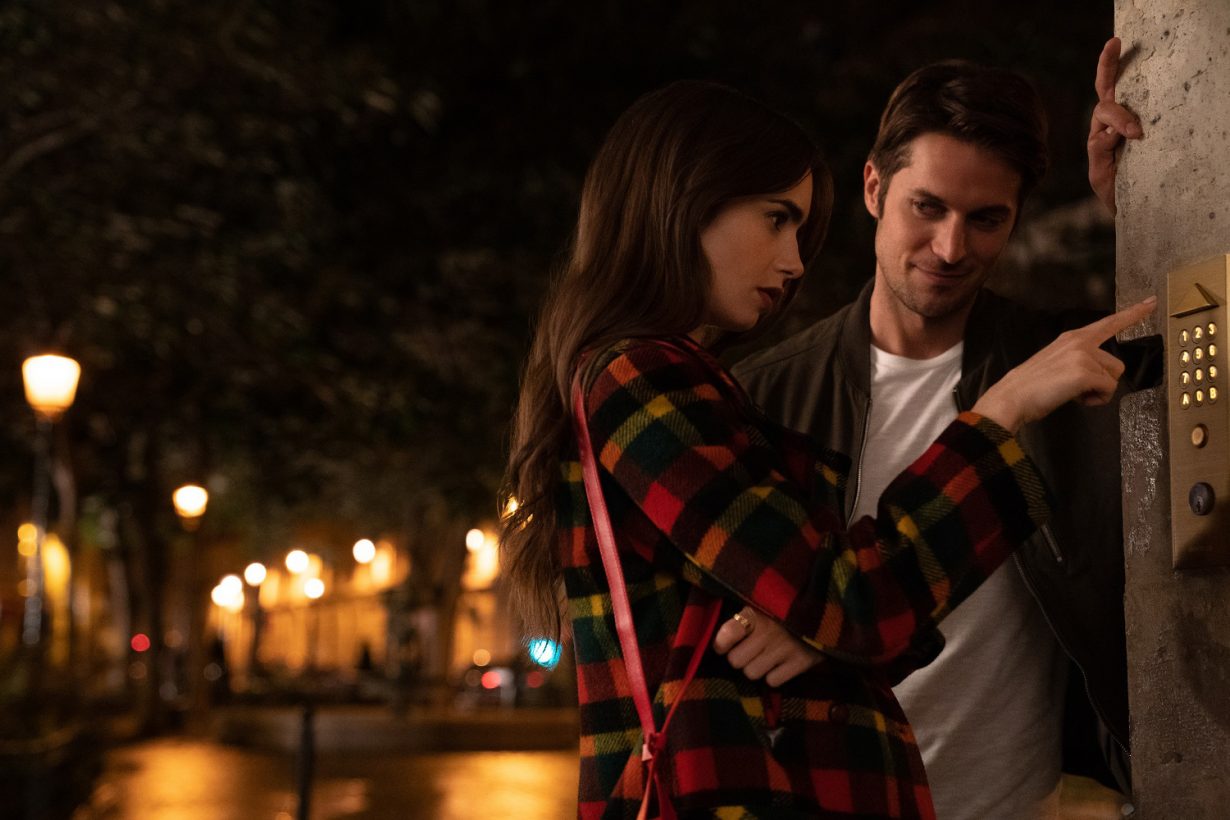
All this is insulting to Emily, and by extension to all the young women the show wants to sell stuff to – starting with a Netflix subscription, maybe a trip to Paris as soon as the pandemic’s over, and in the meantime whatever accessories they might feel they need as a result (see-through raincoats, lime green bucket bags, blue berets with red pom-poms, and tiaras, god help us), thinking they will make them feel like they’re in Paris.
In their blatant careening towards the monaaaaaaay that such a show might be expected to generate, Emily in Paris’s producers have demonstrated that they don’t give a fine fuck about writing, characterisation, interior life. (Don’t get me wrong: this isn’t some Forsterian diatribe about round or flat characters. That’s the domain of amateur TV critics.) What they do seem to care about is building the perfect woman, and then tearing her down.
As I watched the show, I kept thinking of Hilary Mantel’s 2013 lecture for the London Review of Books about Kate Middleton and the ‘royal body’. The Duchess of Cambridge, Mantel said, ‘appeared to have been designed by a committee and built by craftsmen, with a perfect plastic smile and the spindles of her limbs hand-turned and gloss-varnished.’ With her perfect abs and immobile mermaid waves, Emily, more so even than Middleton, who is, let’s not forget, a real person, actually has been designed by committee, not to continue the royal line but to sustain the franchise.
On the radio they asked me if I identified with Emily at all and I said uhhhh for what felt like forever in radio time, before saying no, no, not at all. Because when I moved here I wasn’t anything like Emily; not only had I learned French at school, I had a few more notions of Normandy beyond Saving Private Ryan (1998). When I moved here, there were no smart phones, no Instagram, and the American in Paris narrative was about coming here and doing something creative – writing, painting, dancing, whatever – not making sales pitches like Don Draper in stilettos. But I can’t deny our commonalities.
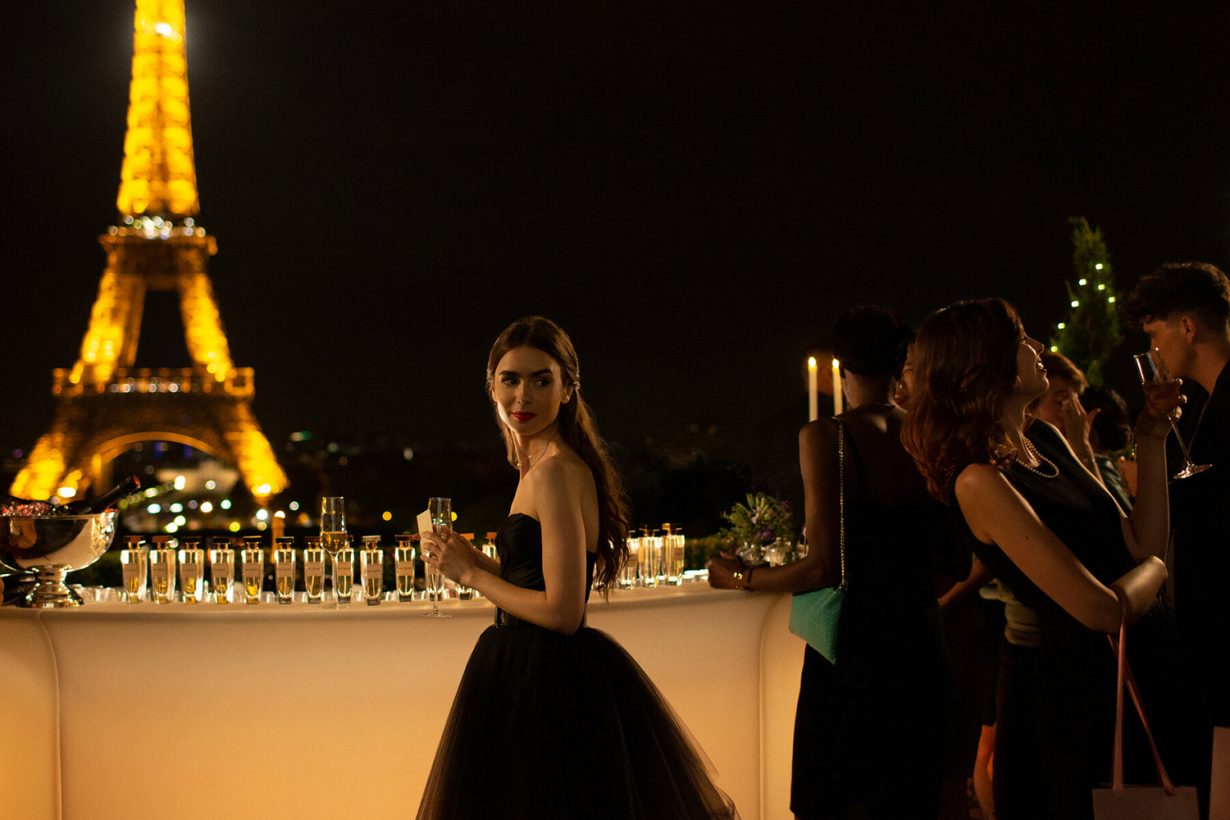
I have a lot of sympathy for the American girl abroad. I’ve been her, I’ve taught her, I occasionally hear from her, reaching out for help finding her feet. But on Emily in Paris, she’s another version of the jeune fille, the young girl, whom everyone feels authorised to hate. Think of every teenage girl on television, with few exceptions – they’re all whiny and intransigent and bothered, and we never really know why. The radical French philosophy collective Tiqqun published a polemic in 1999 called Preliminary Materials for a Theory of the Young Girl, which reads her as the ultimate consumer: when she thinks she’s expressing herself she’s only expressing commodity culture; she has no depth, no intimate reserves, she is all Spectacle.
The young girl is not a gendered concept, but ‘the model citizen as redefined by consumer society since the First World War, in explicit response to the revolutionary menace.’ Although the terms in which Tiqqun make their argument are deeply sexist, their essential point holds: we are all young girls under the capitalist patriarchy. But the young girl herself, the actual gendered young female human animal, is always rife for exploitation, not least by Tiqqun.
In her recent book Females (2019), Andrea Long Chu echoes this argument (though in markedly un-misogynist terms), choosing to put it this way:
‘Everyone is female […] femaleness is a universal sex defined by self-negation, against which all politics, even feminist politics, rebels. Put more simply: Everyone is female, and everyone hates it.’
The jeune fille is all of us, but when she becomes the star of the show she’s none of us – just a skinny body on which to project our fucked-up ideas about beauty and female behaviour. Emily in Paris is a missed opportunity to say something real, for instance, about being a foreigner – an experience it would behove Americans to experience from time to time. (To wit: that early scene where Emily’s normcore boyfriend holds up his brand-new passport saying ‘Look what I got!’) It is difficult to move to a foreign country, especially to a city as notoriously closed-off as Paris, and really, genuinely lonely, in a way the show doesn’t make room for. It is soul-crushing to find yourself rejected for the very compliance that, back home, you believed made you valued and loved.
I’m angry that when the producers decided to tell the story of a young woman, they declined to give her a more textured existence. That they ask her to speak not French, but a dead, prefabricated English: fake it ’til you make it. At one point someone accuses her of being arrogant. ‘More ignorant than arrogant,’ she says, sadly. Why does she have to be ignorant? I groaned at my computer. Because that’s what the producers think of young women: all mermaid curls, no brains.
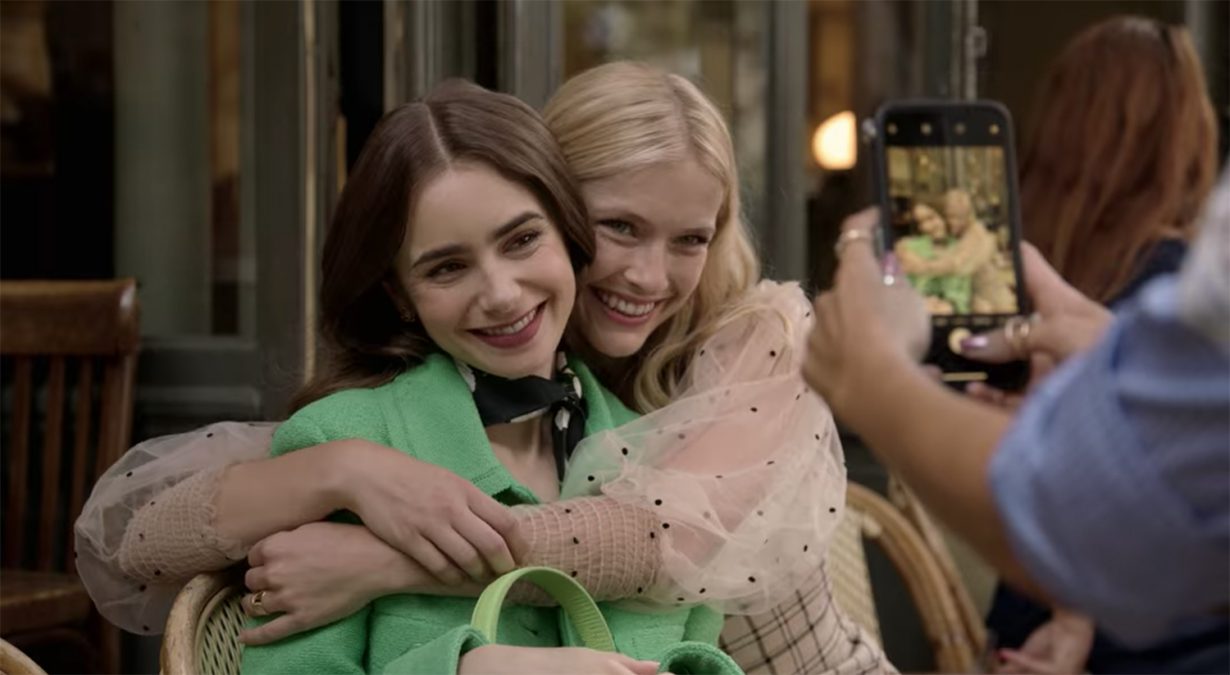
But there was one shining moment of almost self-awareness, towards the end of episode 3. Hot hunky neighbour Gabriel asks Emily how she likes Paris. And the rest of the exchange goes like this:
Emily: I like Paris. But I’m not sure Paris likes me. And maybe that’s ok. I’ve spent my entire life wanting to be liked.
Gabriel: That’s a pretty miserable goal.
Emily: Exactly. So, I’m going to give up trying.
Gabriel: Well, there’s just one problem.
Emily: What’s that.
Gabriel: I like you.
He blinks his big eyes at her, walks away. She thinks about it. Does a cute little nose twitch, performing cuteness. She was on the verge of living for herself, being for herself. And just like that, he reels her back in.
So please, if any of the producers or writers are reading this, I have a plea for you for season two. Let Emily be neither likable nor unlikable, neither perfect nor annoying, but a little softer around the belly, a little more pensive, and isolated, a little more recognizably human. Let her stop trying to be liked, to impress. Give her some down time. Leave Emily alone.
